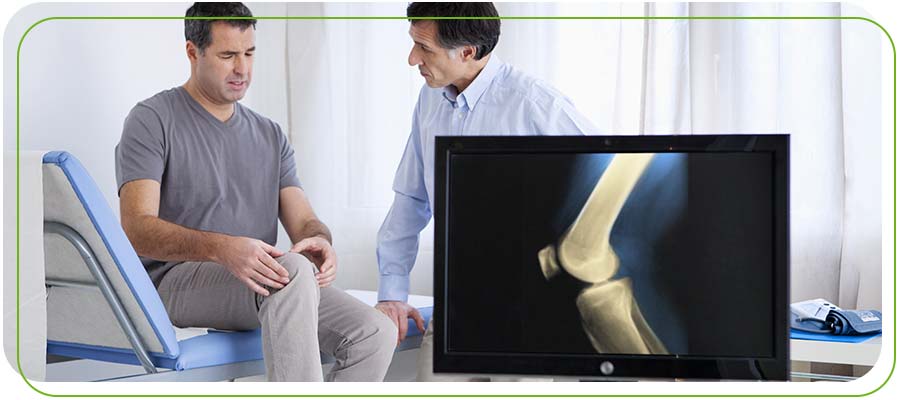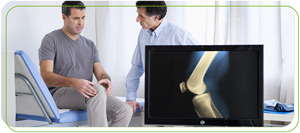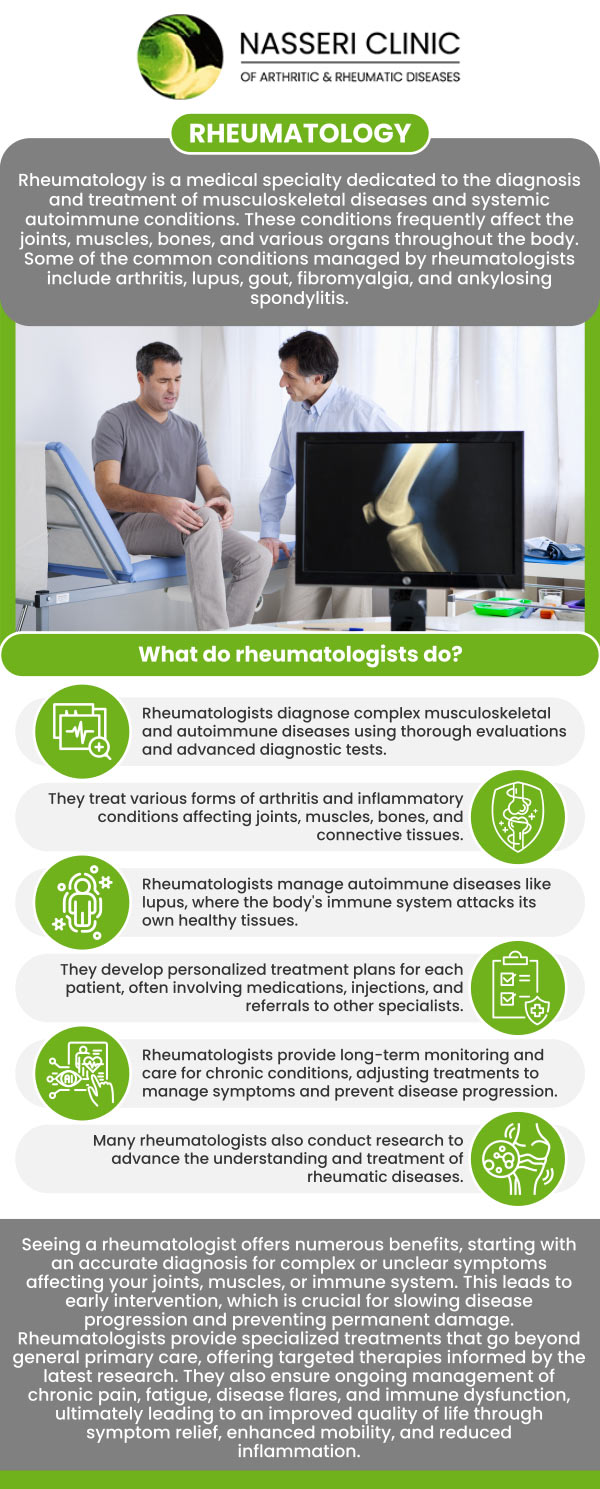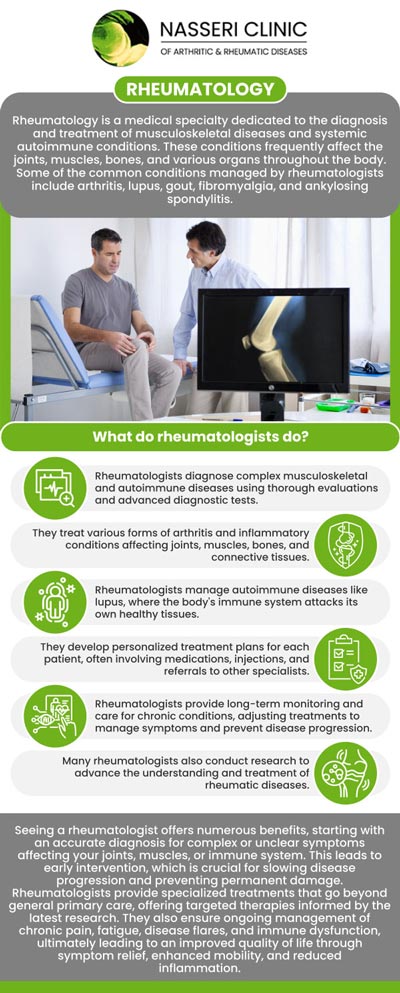What Symptoms Does a Rheumatologist Look For
A rheumatologist looks for symptoms such as joint pain, stiffness, swelling, and fatigue, which may indicate underlying conditions like arthritis or autoimmune disorders. They also assess other signs like limited range of motion, muscle weakness, and unexplained inflammation to help diagnose and develop a tailored treatment plan. Visit Dr. Nasseri, MD for professional evaluation and personalized care for joint pain, autoimmune conditions, and more. For more information, contact us or request an appointment online. We have convenient locations in Catonsville, Glen Burnie, Columbia, Rosedale, Edgewater, North Baltimore, MD.




Table of Contents:
What are red flag signs of rheumatoid arthritis?
What joint symptoms typically lead to a rheumatology evaluation?
What early warning signs of rheumatic diseases do rheumatologists watch for?
Recognizing the early warning signs of rheumatoid arthritis (RA) is crucial for timely diagnosis and effective treatment. At Nasseri Clinic of Arthritic and Rheumatic Diseases, our specialists emphasize prompt attention to these key symptoms to ensure the best possible outcomes and minimize complications related to arthritis.
Persistent Joint Pain and Symmetrical Symptoms
One of the hallmark red flags of rheumatoid arthritis is persistent joint pain affecting multiple joints simultaneously and symmetrically (on both sides of the body). Individuals commonly experience prolonged stiffness lasting more than 30 minutes, particularly in the mornings or after extended periods of inactivity. Often, this stiffness gradually improves throughout the day.
Joint Swelling, Warmth, and Tenderness
Swelling of joints accompanied by warmth and tenderness is another significant indicator. Joints most frequently affected include the hands, wrists, knees, ankles, and feet. Over time, untreated inflammation can cause joint deformities and impair daily function, highlighting the importance of early evaluation by our rheumatic specialists.
Fatigue and Systemic Symptoms
Patients may also experience systemic symptoms such as persistent fatigue, unexplained weight loss, fever, or a general sense of feeling unwell, indicating underlying inflammation. Additionally, rheumatoid nodules—small, firm lumps beneath the skin often located around pressure points such as the elbows or fingers—may develop.
Early Intervention at Nasseri Clinic
Early recognition of these red flag symptoms significantly improves the likelihood of successful management and reduces the risk of long-term complications. If you or a loved one consistently experiences these symptoms, we encourage you to schedule an evaluation with our experienced rheumatologists. Our dedicated team is committed to providing personalized care and comprehensive treatment plans tailored to each patient’s specific needs.
Joint-related symptoms prompting an evaluation often present gradually or acutely and can significantly impact daily functioning and overall quality of life. At our clinic, one of the most common reasons patients seek care is persistent joint pain accompanied by swelling or tenderness, especially when conventional treatments or rest have not provided relief. Additionally, prolonged joint stiffness—often lasting more than half an hour after waking or following periods of inactivity—is frequently associated with inflammatory arthritis and serves as an essential reason to consult our clinic’s rheumatology specialists.
Other symptoms that our clinic regularly evaluates include joint swelling, redness, and warmth, all indicative signs of inflammation commonly seen in conditions such as rheumatoid arthritis or gout. Likewise, a noticeable reduction in joint mobility or gradual loss of range of motion often signals an underlying rheumatologic condition that requires specialized assessment and intervention.
At Nasseri Clinic, we pay particular attention to patients experiencing symptoms involving multiple joints, especially symmetrical involvement (such as both hands, wrists, knees, or ankles), as this pattern is characteristic of autoimmune rheumatic diseases. Additionally, chronic joint discomfort accompanied by systemic symptoms like persistent fatigue, unexplained fever, weight loss, or skin rashes may suggest autoimmune connective tissue disorders, further emphasizing the importance of evaluation by our expert rheumatologists.
Ultimately, any persistent, unexplained joint symptom affecting your daily activities, mobility, or overall quality of life warrants a comprehensive evaluation by the experienced team at Nasseri Clinic of Arthritic and Rheumatic Diseases. Our specialists are committed to accurately diagnosing inflammatory and autoimmune joint conditions and developing personalized treatment plans to help restore function, reduce pain, and significantly enhance your quality of life.
At Nasseri Clinic of Arthritic and Rheumatic Diseases, our expert rheumatologists focus intensively on recognizing and evaluating early indicators of rheumatic conditions, ensuring timely intervention and optimal patient outcomes.
One of the primary warning signs our specialists evaluate is persistent joint pain and stiffness, particularly when symptoms intensify in the morning or after periods of rest. Such discomfort is often accompanied by noticeable swelling, tenderness, redness, or warmth around affected joints, signaling potential inflammation characteristic of arthritic and rheumatic conditions.
Additionally, our rheumatologists pay close attention to systemic symptoms, such as persistent fatigue or unexplained weakness. Many autoimmune and inflammatory rheumatic disorders trigger systemic inflammation, causing patients to experience exhaustion even with minimal physical exertion. Recurrent or unexplained low-grade fevers, without clear signs of infection, are also carefully assessed at Nasseri Clinic, as they may indicate underlying autoimmune processes or inflammatory conditions.
Our specialists remain vigilant about skin manifestations as well, including rashes, redness, or unusual thickening and tightening of the skin. Such dermatological signs may be indicative of conditions like lupus or scleroderma. Changes in nail appearance—including nail pitting, discoloration, or separation from the nail bed—are also closely examined, given their association with autoimmune disorders such as psoriatic arthritis.
Unintentional weight loss or a general feeling of malaise is another critical symptom our rheumatologists observe. Sudden or gradual weight changes without intentional dietary adjustments could indicate underlying systemic inflammation or autoimmune activity. Additionally, dryness of the eyes and mouth, which can signal conditions like Sjögren’s syndrome, is closely monitored and assessed by our specialists.
Moreover, the Nasseri Clinic rheumatologists carefully evaluate any signs of decreased mobility or difficulty performing everyday tasks. Patients experiencing challenges moving joints, diminished strength, or a reduced range of motion undergo thorough evaluation to determine whether these functional impairments are related to an underlying rheumatic condition.
By meticulously tracking and assessing these subtle yet diverse early warning signs, the dedicated team at Nasseri Clinic of Arthritic and Rheumatic Diseases is committed to diagnosing rheumatic disorders promptly. Early diagnosis and intervention significantly enhance treatment effectiveness, ultimately improving our patients’ health outcomes and overall quality of life. For more information, contact us or book an appointment online. We have convenient locations to serve you in Maryland. We serve patients from Catonsville MD, Glen Burnie MD, Columbia MD, North Baltimore MD, Rosedale MD, Edgewater MD, Hebbville MD, Woodlawn MD, Pasadena MD, Jacobsville MD, Ellicott City MD, Laurel MD, Dundalk MD, Halethorpe MD, Overlea MD, Parkville MD, Riva MD, Annapolis MD, Ferndale MD, and surrounding areas.
Check Out Our 5 Star Reviews


Additional Services You May Need

Additional Services You May Need
▸ Arthritis Care
▸ Infusion Therapy
▸ Lab Services
▸ Radiology
▸ NCARD NRACE
▸ BioFlex Laser Therapy
▸ Ultrasound Guided Injection
▸ NCARD PRP
▸ NCARD Myers
▸ Rheumatology
▸ Myositis
▸ Osteoporosis
▸ Ulcerative Colitis
▸ Multiple Sclerosis
▸ Saphnelo Infusion
▸ Injection Treatments
▸ Intravenous Immunoglobulin Therapy
▸ Asthma
▸ Crohn’s Disease
▸ Fibromyalgia
▸ Infusion Therapy for Gout
▸ Inflammatory Eye Disease
▸ Inflammatory Skin Disease
▸ Vasculitis
▸ Iron Deficiency
▸ Lupus


